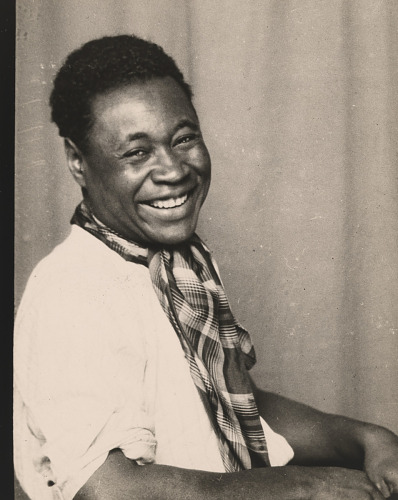Born Festus Claudius McKay in Sunny Ville, Jamaica to farmers, Claude McKay was a Jamaican American poet. But farming and agriculture is not what he turned to while growing up. The influence of his college library, the poets and literary voces around him affected him greatly and he turned to writing.

McKay began publishing poems in various journals, including Pearson’s Magazine, in 1917. He published two poems in the monthly literary magazine Seven Arts under the pen name Eli Edwards. McKay’s canonical poem “If We Must Die” was first published in Max Eastman’s Communist magazine Liberator. The poem, which is McKay’s best-known work, is a response to the terrorism that Black citizens throughout the country experienced at the hands of their white neighbors in 1919, during a spate of bloody riots referred to historically as Red Summer.
In further pursuit of Communism as the solution to America’s race problem, McKay traveled to the Soviet Union around September 20, 1922. During his sojourn, he met and befriended Leon Trotsky. McKay published the propagandist tract The Negroes in America the following year. The book was re-released in 1979. His other prose works are My Green Hills of Jamaica (1922, 1979), Home to Harlem (1928), Banjo: A Story Without a Plot (1929), Gingertown (1932), Banana Bottom (1933), and the autobiography A Long Way from Home (1937). Trial by Lynching (1977) was published posthumously.
McKay died of congestive heart failure in a Chicago hospital at age 57. Several collections of poetry were published after his death, including The Dialectic Poetry of Claude McKay (1972) and The Passion of Claude McKay: Selected Poetry and Prose (1973). McKay’s long-unpublished manuscript Romance in Marseille was released in February 2020.


McKay began publishing poems in various journals, including Pearson’s Magazine, in 1917. He published two poems in the monthly literary magazine Seven Arts under the pen name Eli Edwards. McKay’s canonical poem “If We Must Die” was first published in Max Eastman’s Communist magazine Liberator. The poem, which is McKay’s best-known work, is a response to the terrorism that Black citizens throughout the country experienced at the hands of their white neighbors in 1919, during a spate of bloody riots referred to historically as Red Summer.
In further pursuit of Communism as the solution to America’s race problem, McKay traveled to the Soviet Union around September 20, 1922. During his sojourn, he met and befriended Leon Trotsky. McKay published the propagandist tract The Negroes in America the following year. The book was re-released in 1979. His other prose works are My Green Hills of Jamaica (1922, 1979), Home to Harlem (1928), Banjo: A Story Without a Plot (1929), Gingertown (1932), Banana Bottom (1933), and the autobiography A Long Way from Home (1937). Trial by Lynching (1977) was published posthumously.
McKay died of congestive heart failure in a Chicago hospital at age 57. Several collections of poetry were published after his death, including The Dialectic Poetry of Claude McKay (1972) and The Passion of Claude McKay: Selected Poetry and Prose (1973). McKay’s long-unpublished manuscript Romance in Marseille was released in February 2020.

Image - Signed copy of McKay’s first volume of poetry, Songs of Jamaica (1912), dedicated to historian and archivist Arturo Alfonso Schomburg. (Schomburg Center for Research in Black Culture, NYPL Digital Collection
Claude McKay published Harlem Shadows in 1922.
The poem centers around a group of young black women who make money as sex workers in Harlem. The speaker doesn't cast any judgment on the sex workers themselves, instead implying that racism and poverty has compelled these young black women into such work out of necessity.

Harlem Shadows spotlights the difficult lives of Black sex workers in 1920s Harlem. Watching these women one night, the speaker suggests that the stern harsh world around them, has forced them into a much criticised and ridiculed occupation out of necessity. The poem seeks to elicit sympathy for a group of people that the rest of society often overlooks, and frames their work as a means of survival in the face of poverty, racism, and disempowerment.
The poem’s speaker never comes across as judgmental towards the sex workers themselves, focusing instead on the demanding nature of their work and the fact that they have few, if any, alternatives. The women must “trudg[e]” from “street to street” with “weary feet,” unable to rest despite their exhaustion. They're "thinly shod" as well, wearing clothes and shoes that do little to keep out the winter cold. Through these details, the speaker highlights the toil such women go through simply to support themselves.
I hear the halting footsteps of a lass
In Negro Harlem when the night lets fall
Its veil. I see the shapes of girls who pass
To bend and barter at desire's call.
Ah, little dark girls who in slippered feet
Go prowling through the night from street to street!
Such language also evokes the history of Black oppression in the U.S. and abroad. The repeated references to walking and feet evoke the seemingly endless labor on plantations during the era of American slavery, as well as the horrific forced marches of the enslaved (which led to thousands of deaths). The speaker thus links these women's circumstances to a long history of racism and oppression.



No comments:
Post a Comment